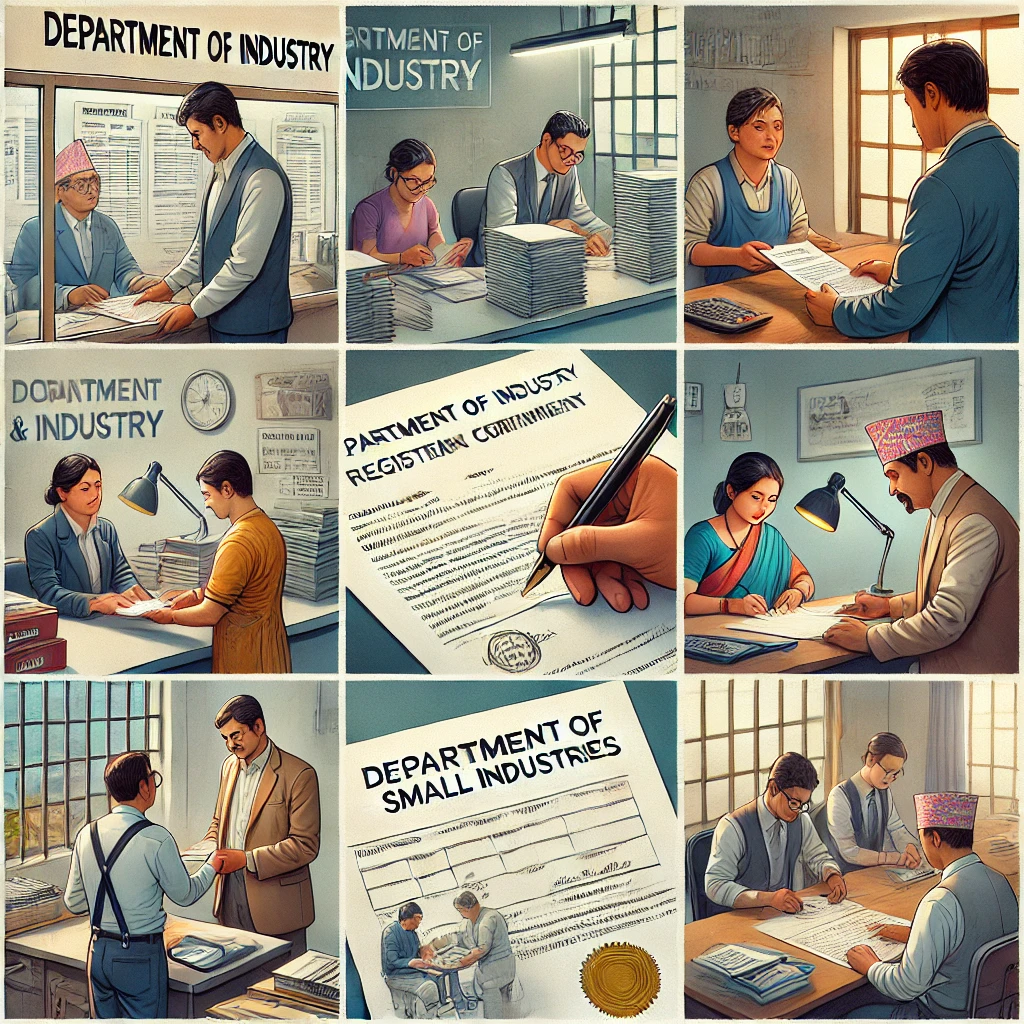
Dreaming of starting your own small business in Nepal? 🇳🇵 You’re not alone! The entrepreneurial spirit is alive and thriving in this beautiful Himalayan nation. But before you can turn your vision into reality, there’s one crucial step you can’t afford to skip: registering your small scale industry.
For many budding entrepreneurs, the registration process can seem like a daunting maze of paperwork and bureaucracy. Where do you start? What documents do you need? How much will it cost? These questions might be swirling in your mind, causing hesitation and delay. But fear not! We’re here to guide you through the entire process, from understanding what qualifies as a small scale industry in Nepal to navigating the legal framework and post-registration compliance.
In this comprehensive guide, we’ll break down the small scale industry registration process in Nepal into manageable steps. We’ll explore the financial considerations, common challenges you might face (and how to overcome them), and the numerous benefits that await you once you’ve officially registered your business. So, let’s embark on this journey together and turn your entrepreneurial dreams into a registered reality!
Understanding Small Scale Industries in Nepal
A. Definition and characteristics
Small scale industries in Nepal are typically defined as businesses with limited capital investment, a smaller workforce, and localized operations. These enterprises usually have investments ranging from NPR 500,000 to NPR 100 million and employ fewer than 50 workers. Characteristics of small scale industries in Nepal include:
- Labor-intensive production methods
- Use of locally available resources
- Limited technological infrastructure
- Family-owned or partnership-based ownership structures
- Focus on traditional or niche product markets
B. Importance to Nepal’s economy
Small scale industries play a crucial role in Nepal’s economic development:
| Economic Impact | Description |
|---|---|
| Employment Generation | Creates job opportunities for skilled and unskilled workers |
| Rural Development | Promotes industrialization in rural and semi-urban areas |
| Export Contribution | Contributes to export earnings through unique handicrafts and products |
| Poverty Alleviation | Helps reduce poverty by providing income sources to marginalized groups |
C. Types of small scale industries
Nepal’s small scale industries encompass a diverse range of sectors:
- Handicrafts and artisanal products
- Woodcarving
- Metal crafts
- Textile weaving
- Food processing
- Dairy products
- Fruit and vegetable preservation
- Agro-based industries
- Tea processing
- Spice production
- Light manufacturing
- Furniture making
- Plastic goods production
- Service-oriented businesses
- IT services
- Tourism-related enterprises
These industries contribute significantly to Nepal’s economic diversity and cultural heritage. As we explore the legal framework for registration in the next section, it’s important to understand how these various types of small-scale industries fit into the regulatory landscape.
Legal Framework for Registration

A. Relevant laws and regulations
The legal framework for small-scale industry registration in Nepal is primarily governed by the Industrial Enterprises Act 2076 (2020) and the Industrial Enterprises Rules 2076 (2020). These laws provide the foundation for establishing and operating small-scale industries in the country. Additionally, the Company Act 2063 (2006) and the Foreign Investment and Technology Transfer Act 2075 (2019) play crucial roles in regulating business entities and foreign investments.
| Law/Regulation | Key Aspects |
|---|---|
| Industrial Enterprises Act 2076 | Classification of industries, registration procedures |
| Industrial Enterprises Rules 2076 | Detailed guidelines for implementation |
| Company Act 2063 | Company formation and governance |
| Foreign Investment and Technology Transfer Act 2075 | Regulations for foreign investments |
B. Governing bodies and authorities
Several government bodies are involved in the registration and regulation of small-scale industries in Nepal:
- Department of Industry (DOI)
- Office of Company Registrar (OCR)
- Department of Cottage and Small Industries (DCSI)
- Nepal Industrial Development Corporation (NIDC)
These authorities work collaboratively to ensure the smooth registration and operation of small-scale industries.
C. Recent policy changes affecting registration
The Nepalese government has introduced several policy changes to streamline the registration process and promote small-scale industries:
- Implementation of online registration systems
- Simplified documentation requirements
- Reduced registration fees for certain categories
- Introduction of one-window service centres
These changes aim to create a more business-friendly environment and encourage entrepreneurship in Nepal. As we move forward, understanding these legal frameworks and recent policy changes is crucial for anyone looking to start a small-scale industry in Nepal.
Step-by-Step Registration Process

A. Choosing a business structure
When starting your small-scale industry in Nepal, selecting the right business structure is crucial. The most common options are:
- Sole Proprietorship
- Partnership
- Private Limited Company
- Public Limited Company
| Structure | Advantages | Disadvantages |
|---|---|---|
| Sole Proprietorship | Easy to set up, full control | Unlimited liability |
| Partnership | Shared resources, expertise | Shared liability |
| Private Limited Company | Limited liability, professional image | More complex setup |
| Public Limited Company | Access to public funding | Strict regulations |
Consider factors such as liability, taxation, and future growth potential when making your decision.
B. Obtaining necessary documents
To register your small-scale industry, you’ll need to gather the following documents:
- Citizenship certificate
- Recent passport-sized photographs
- Proof of address
- Business plan
- Rental agreement or property ownership documents
- No Objection Certificate (NOC) from local authorities
C. Registering with the Department of Cottage and Small Industries
Once you have your documents ready, visit the Department of Cottage and Small Industries (DCSI) to initiate the registration process. You’ll need to:
- Fill out the registration application form
- Submit all required documents
- Pay the registration fee
- Attend an interview with DCSI officials
D. Tax registration and PAN number acquisition
After registering your business, you must obtain a Permanent Account Number (PAN) from the Inland Revenue Department. This process involves:
- Completing the PAN application form
- Submitting necessary documents
- Paying the required fee
E. Additional permits and licenses
Depending on your industry type, you may need to obtain additional permits or licenses. These might include:
- Environmental clearance
- Food and drug licenses
- Export/import licenses
Now that you understand the registration process, let’s explore the financial considerations involved in setting up your small-scale industry in Nepal.
Financial Considerations

A. Minimum capital requirements
When registering a small-scale industry in Nepal, it’s crucial to understand the minimum capital requirements. These vary depending on the type and size of the industry. Here’s a breakdown:
| Industry Type | Minimum Capital Requirement (NPR) |
|---|---|
| Micro | Up to 500,000 |
| Small | 500,000 to 10,000,000 |
| Medium | 10,000,000 to 250,000,000 |
It’s important to note that these figures are subject to change, so always verify with the Department of Industry for the most up-to-date information.
B. Registration fees and charges
The registration process involves several fees and charges. Here’s a list of the primary costs you’ll encounter:
- Registration application fee
- Certificate issuance fee
- Environmental Impact Assessment (EIA) fee (if applicable)
- Municipality/local government fees
- Chamber of Commerce membership fee
The exact amounts can vary based on your industry type and location. It’s advisable to budget for these expenses in advance to ensure a smooth registration process.
C. Potential government incentives and subsidies
The Nepalese government offers various incentives to promote small-scale industries. Some key benefits include:
- Tax exemptions for certain industry types
- Subsidized electricity rates for manufacturing units
- Export promotion incentives
- Skill development programs
These incentives aim to foster industrial growth and create employment opportunities. However, eligibility criteria and available subsidies may change, so it’s essential to consult with the Department of Industry or a local business advisor for the most current information.
Now that we’ve covered the financial aspects of registration, let’s explore some common challenges you might face during the process and how to overcome them.
Common Challenges and Solutions

A. Navigating bureaucracy
Navigating bureaucracy can be a significant challenge for small-scale industry owners in Nepal. The process often involves multiple government departments and complex paperwork. To overcome this:
- Research thoroughly before starting the registration process
- Seek guidance from experienced business owners or consultants
- Utilize online resources provided by government agencies
- Consider hiring a professional to handle the paperwork
B. Meeting regulatory requirements
Small-scale industries must comply with various regulations, which can be overwhelming. Here’s a table summarizing key regulatory areas and solutions:
| Regulatory Area | Solution |
|---|---|
| Environmental | Conduct an environmental impact assessment |
| Labor laws | Familiarize yourself with labor regulations and implement fair practices |
| Quality standards | Invest in quality control measures and obtain necessary certifications |
| Tax compliance | Maintain accurate financial records and consult with a tax professional |
C. Accessing capital and resources
Limited access to capital and resources can hinder the growth of small-scale industries. To address this challenge:
- Explore government-backed loan schemes for small businesses
- Consider microfinance options and cooperative funding
- Participate in industry associations to network and share resources
- Leverage technology to optimize operations and reduce costs
By addressing these common challenges with practical solutions, small-scale industry owners in Nepal can navigate the registration process more effectively and set a strong foundation for their businesses. As we move forward, it’s crucial to understand the importance of maintaining compliance even after registration.
Post-Registration Compliance

Annual reporting obligations
Once you’ve registered your small scale industry in Nepal, it’s crucial to stay compliant with annual reporting requirements. These obligations typically include:
- Submitting annual financial statements
- Providing updates on business activities
- Reporting any changes in company structure or ownership
Here’s a breakdown of the key reporting deadlines:
| Document | Deadline | Submitted to |
|---|---|---|
| Annual Financial Statement | Within 6 months of fiscal year-end | Company Registrar’s Office |
| Tax Clearance Certificate | Within 3 months of fiscal year-end | Inland Revenue Department |
| Updated Company Details | As changes occur | Company Registrar’s Office |
Tax filing requirements
Proper tax compliance is essential for small-scale industries in Nepal. Key tax obligations include:
- Value Added Tax (VAT) – if applicable
- Income Tax
- Social Security Tax
Remember to:
- Keep accurate records of all financial transactions
- File tax returns on time to avoid penalties
- Seek professional advice if you’re unsure about tax calculations
Labor law compliance
Adhering to labor laws is crucial for maintaining a positive work environment and avoiding legal issues. Key areas of focus include:
- Minimum wage requirements
- Working hours and overtime regulations
- Workplace safety standards
- Employee benefits and social security contributions
Regularly review and update your HR policies to ensure ongoing compliance with Nepal’s labor laws. This proactive approach will help you maintain good relationships with your employees and avoid potential legal complications.
Benefits of Formal Registration

Access to government support programs
Small-scale industries that undergo formal registration gain access to various government support programs. These initiatives are designed to foster growth and sustainability in the sector. Here’s a breakdown of key programs:
| Program Type | Description | Benefits |
|---|---|---|
| Financial Assistance | Low-interest loans, grants | Capital for expansion, equipment |
| Technical Support | Training, workshops | Skill development, productivity boost |
| Marketing Aid | Trade fairs, exhibitions | Market exposure, networking |
| Infrastructure | Industrial parks, clusters | Reduced operational costs |
Improved credibility with customers and suppliers
Formal registration significantly enhances a business’s reputation:
- Legal entity status boosts trust
- Verified business information increases transparency
- Compliance with regulations demonstrates professionalism
Easier access to financing options
Registered businesses enjoy broader financing opportunities:
- Bank loans with favourable terms
- Venture capital and angel investor interest
- Government-backed credit schemes
- Microfinance institution support
Legal protection and dispute resolution
Registration provides crucial legal safeguards:
- Intellectual property protection
- Contract enforcement capabilities
- Access to formal dispute resolution mechanisms
- Limited liability protection for owners
Now that we’ve explored the benefits of formal registration, let’s examine the post-registration compliance requirements that businesses must adhere to for continued legal operation.

Registering a small-scale industry in Nepal is a crucial step towards formalizing your business and unlocking numerous benefits. The process, while detailed, is designed to ensure compliance with legal requirements and protect both entrepreneurs and consumers. By following the step-by-step registration process, addressing financial considerations, and understanding post-registration compliance, you can navigate common challenges and set your business on a path to success.
Taking the time to properly register your small scale industry not only ensures legal operation but also opens doors to various government support programs, easier access to financing, and enhanced credibility in the market. As Nepal continues to promote entrepreneurship and economic growth, registered small scale industries play a vital role in driving innovation and creating employment opportunities. Don’t hesitate to seek guidance from relevant government agencies or professional advisors to make your registration process smooth and efficient.

